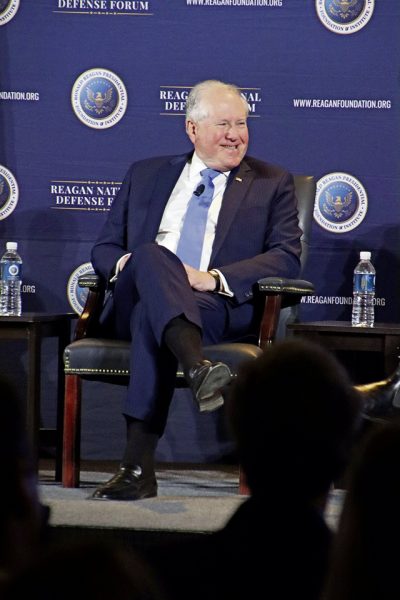
Air Force Secretary Frank Kendall made it clear that the Air Force and Space Force are fully committed — and pushing hard — to develop and deploy artificial intelligence as a key element in meeting security challenges posed by China and other adversaries Dec. 2.
Kendall’s remarks were not new, but by voicing them during a session at the influential Reagan National Defense Forum, he added additional weight to the Department of the Air Force’s efforts to use AI as part of a larger push to modernize.
“I care a lot about civil society and the law of armed conflict,” Kendall said. “Our policies are written around those laws. You don’t enforce laws against machines, you enforce them against people. Our challenge is not to limit what we can do with AI but to find how to hold people accountable for what the AI does. The way we should approach is to figure out how to apply the laws of armed conflict to the applications of AI. Who do we hold responsible for the performance of that AI and what do we require institutions to do before we field these kinds of capabilities and use them operationally.”
Kendall pointed out that China and other adversaries are aggressively using AI, and while the U.S. maintains an edge, it is shrinking. Kendall’s comments dovetailed with those from Air Force Chief of Staff Gen. David Allvin, who said at a separate session during the conference that the Air Force must modernize to properly meet the security threats of today.
Part of that effort, Allvin said, is diligently working to integrate AI and machine learning into new capabilities that mesh seamlessly with mission needs and proven technologies, while understanding performance tradeoffs.
“I do believe the future is going to be about human-machine teaming,” Allvin said. “Optimizing the performance and being able to operate at speed. That investment in our collaborative combat aircraft program is what is going to get us there.”
Speed and automation of AI systems have vastly shortened decision timelines. That’s why the DoD’s National Defense Strategy focuses on accelerating decision making and the way information is analyzed and shared.
“We are leveraging algorithms and starting with data fusion and being able to gain insights,” Allvin said. “The changing character of war is speed. If we are going to be privileging speed and have massive amounts of data, the ability to have algorithms and the tools that support and let the analysts do what only humans can do which is make that human decision.”
“Our job on the government side more than anything else is to thoroughly understand this technology, have the expertise we need to really get into the details of it and appreciate how it really works,” Kendall said. “To be creative about helping industry find new applications for that technology and developing ways to evaluate it get the confidence we’re going to need to ensure that it can be used ethically and reliably when it is in the hands of our warfighters.”
Replacing obsolete, legacy systems by harnessing emerging information, communications, and AI technologies to provide operational targeting and decision support with the speed, adaptability and resilience needed to fight in a highly contested environment is a priority for DAF and falls under Kendall’s Operation Imperatives.
“The critical parameter on the battlefield is time,” Kendall said. “The AI will be able to do much more complicated things much more accurately and much faster than human beings can. If the human is in the loop, you will lose. You can have human supervision and watch over what the AI is doing, but if you try to intervene you are going to lose. The difference in how long it takes a person to do something and how long it takes the AI to do something is the key difference.”
Rapid AI development requires DAF to be agile and adaptable in its approach, focusing on rapid testing, experimentation and deployment. The Department of Defense continues to maintain a robust regulatory and ethical framework to ensure the responsible use of AI in defense.
Both men stressed the importance of innovation. Allvin said that innovation is a critical element of modernization and is necessary for maintaining readiness.
“War is a human thing and the ability to leverage technology with human innovation is something we can never walk away from as we’re continuing to develop and more sophisticated systems,” Allvin said.
The Reagan National Defense Forum, celebrating “10 Years of Promoting Peace Through Strength,” brings together leaders from across the political spectrum and key stakeholders in the defense community, including members of Congress, current and former presidential administration officials, senior military leadership, industry executives, technology innovators and thought leaders. Their mission is to review and assess policies that strengthen America’s national defense in the context of the global threat environment.







